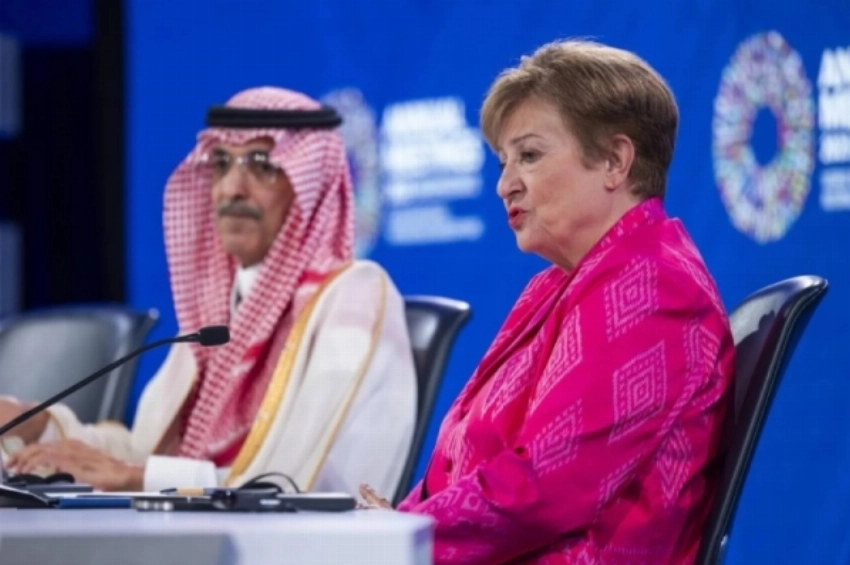IMF Chief Praises Saudi Arabia’s Support for Syria

Washington, The Gulf Observer: International Monetary Fund (IMF) Managing Director Kristalina Georgieva has expressed gratitude to Saudi Arabia for accelerating its support for war-stricken Syria, while revealing that she has received an invitation to visit the Kingdom.
Georgieva made the remarks during a joint press conference with Saudi Finance Minister Mohammed Al-Jadaan, who also serves as Chairman of the International Monetary and Financial Committee (IMFC), which represents the IMF’s 191 member countries.
IMF Acknowledges Saudi Leadership and Humanitarian Role
In her statement, Georgieva commended Saudi Arabia’s constructive role in supporting regional stability and economic recovery, particularly its initiatives to assist crisis-affected nations. The IMF chief underscored the importance of sustained international cooperation to address global challenges, including post-conflict reconstruction and debt sustainability.
Al-Jadaan, for his part, emphasized that the global economy is undergoing a profound transformation that brings both opportunities and challenges. He stated that the top priority remains addressing debt burdens, reaffirming continued support for governments to undertake productive investments and maintain fiscal responsibility.
Saudi Participation in the G20 FMCBG Meetings
Al-Jadaan and Saudi Central Bank (SAMA) Governor Ayman Alsayari concluded their participation in the fourth G20 Finance Ministers and Central Bank Governors (FMCBG) Meeting, held on October 15–16 in Washington, D.C., under the South African Presidency, on the sidelines of the World Bank Group–IMF Annual Meetings.
In his address at the G20 session, Al-Jadaan noted that the global economy faces persistent challenges, some of which may extend into 2026, as nations continue to adapt to structural transformations in trade, technology, and energy. He cautioned against withdrawal from the multilateral trading system, urging instead for collective action to improve global trade governance, enhance trust, and encourage long-term investment flows.
Fiscal Discipline, Innovation, and Global Coordination
The minister stressed that fiscal discipline and public debt sustainability remain cornerstones of macroeconomic stability, calling for enhanced transparency, sound financial governance, and spending efficiency.
He also pointed to the rapid pace of technological innovation, including artificial intelligence and digital assets, which demand proactive regulatory frameworks that balance opportunity with risk management. Al-Jadaan urged international financial institutions to provide clear guidance to help countries align national policies with global financial stability and resilience objectives.
Saudi Arabia’s Commitment to Africa’s Growth
During discussions on supporting Africa’s economic growth, Al-Jadaan highlighted the continent’s rising importance to global economic expansion and called for practical and implementable solutions that reduce capital costs, stimulate private investment, and promote financial sustainability.
He stressed that achieving sustainable progress in Africa requires stronger support from multilateral institutions to implement structural reforms, enhance productivity, and foster private sector-led development.
Al-Jadaan reaffirmed that Saudi Arabia’s partnership with Africa is longstanding, noting that the Kingdom has financed numerous projects in infrastructure, energy, and healthcare across more than 40 African countries, in line with its commitment to shared development and prosperity.
Advancing a Resilient and Inclusive Global Economy
Concluding his remarks, Al-Jadaan underscored the pivotal role of the G20 in advancing the global financial reform agenda, strengthening debt resolution mechanisms, and fostering public-private cooperation to build a more resilient, inclusive, and sustainable global financial system.
The meetings in Washington reaffirmed Saudi Arabia’s leadership role in global economic governance and its commitment to multilateral cooperation, sustainable development, and financial stability across regions.


